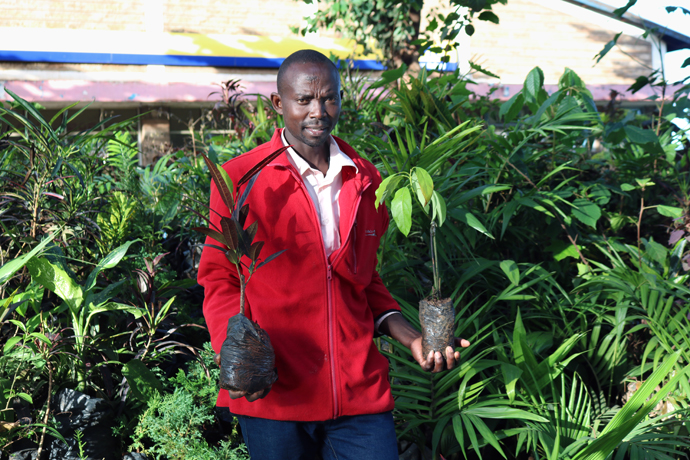Key Points:
- Members of Youth for Christ in Meru, a district-wide church youth program, are focusing on khat abuse.
- Impoverished youth often drop out of school to produce and chew the flowering plant, said to cause excitement, appetite loss and euphoria.
- Youth for Christ in Meru members lead interventions that sensitize youth to the effects of khat chewing and inspire alternative activities.
- More than five small businesses have been established by the youth program.
Young people in The United Methodist Church’s Eastern Kenya District are taking a collective stand against substance abuse and addiction.
Members of Youth for Christ in Meru, a district-wide youth program started in 2022, are focusing on khat abuse. Khat is a flowering plant containing the alkaloid cathinone, a stimulant said to cause excitement, appetite loss and euphoria. While khat is legal and socially acceptable in Kenya, it is illegal in many other countries.
Young people chew miraa (a khat variety in Meru), emphasizing both its economic role and place in local traditions. Impoverished boys and young men also work on khat farms rather than attend school. While khat chewing is sometimes blamed for poor academic performance, many parents allow it for their sons, even those in primary school.

Youth for Christ in Meru leads interventions that sensitize youth on the effects of khat chewing. Dubbed “YCM,” the project strives to reduce school dropout cases caused by khat chewing.
The United Methodist youth in Meru also are committed to offering alternative livelihoods for those depending on khat production for survival. More than five small businesses have been established by the youth program, including two car washes and a fresh vegetable store in Makutano, a secondhand clothing store, a flower and fruit-tree nursery in Meru town, and a fruit store in Gateway.
James Muirigi is one beneficiary of the church program.
“It’s all thanks to YCM that I am where I am now,” said Muirigi. “I was trained in plant production to operate a flower and fruit-tree nursery, and I’ve been able to raise our plant population from 200 to 2,000 in less than a year.
“YCM is helping young people to refrain from khat chewing and focus on building their lives.”

Youth for Christ in Meru uses a faith-based approach to help the young people replace negative behaviors with positive attributes.
“I thank YCM for their support and guidance that lifted me from khat addiction,” said John Murimi. “I started chewing khat when in Form 1.”
Now in charge of a car wash operated by Youth for Christ, Murimi is proud of his progress. He hopes to use his experience and privilege to teach others about the effects of khat addiction.
Youth for Christ in Meru member Muriithi Karagara manages a used clothing store. Creating alternative livelihoods, he said, has attracted more youth to join the program because they have a reason not to work in khat production.
“Creating alternative, safe spaces for youth socialization and economic empowerment has encouraged and instilled hope in rehabilitated youth,” he said.

Leenet Gatwiri, who runs Youth for Christ in Meru’s fresh vegetable store, believes the project has paved the way for youth to move from poverty to success.
“YCM has given us an opportunity to transit from dependence to independence,” said Gatwiri. “The project is providing hope for a better future.”
YCM has contributed to the rehabilitation of over 200 youth who were initially addicted to khat chewing, helped 30 boys and 10 girls return to school, and created employment opportunities for 50 youth.
Phylis Kajuju, former chief in Githongo and district lay leader, commended the efforts made by United Methodist youth to reduce khat addiction. She urged church leaders and members to join youth in sensitizing parents on the importance of education for their children and the dangers of leaving school to engage in the khat trade.
“Church leaders and parents should work together to ensure that khat farmers do not use schoolboy laborers on their farms,” Kajuji said. “They should also make sure that the boys are not involved in the khat trade. UMC youth are doing a good job of sensitizing school dropouts and khat traders on how to use khat product income to invest in education.”
Nicholas Gatobu, Youth for Christ in Meru president, said the project empowers youth to excel and succeed. “It instills hope in vulnerable youth, inspiring them to turn their lives around.”
The Rev. Josephat Nturibi, senior pastor of Makutano United Methodist Church, recognizes the youth program’s pivotal role in implementing primary, secondary and higher education in Meru County.

“The church, through its extensive network of learning institutions and YCM, is well positioned to promote not only the campaign against khat addiction, but also (against) alcohol and drugs, to the hundreds of thousands of students enrolled in these institutions,” Nturibi said.
The Rev. Anne Kanini Ntarangwi, Eastern Kenya District superintendent, stressed the church’s importance in reshaping public debate on khat chewing, alcohol and other drugs. She urged shifting the emphasis from punishment to prevention and treatment.
“This is rooted in the Christian belief in the possibilities for behavior modification in the lives of individuals and, eventually, communities,” Ntarangwi said. “We encourage churches to develop sensitization programs and resources for young people to start alternative livelihoods other than khat businesses in order to catalyze the recovery process from khat addiction.
“According to the Bible,” she continued, “the church's role is not limited to the spiritual well-being of the people in the community. Jesus himself cared for the people he ministered to, feeding, healing and even raising the dead.”
Ntarangwi said Kenya and Africa are losing generations of young people through drug and alcohol abuse.
“A country, or even a continent, which has lost its youth has lost itself.”
Gad Maiga is a communicator for the Kenya-Ethiopia Conference.
News media contact: Julie Dwyer at [email protected]. To read more United Methodist news, subscribe to the free Daily and Friday Digest.




